Strategic Management and Sustainability: Private Sector and SDGs
VerifiedAdded on 2022/12/17
|10
|2434
|93
Essay
AI Summary
This essay provides a comprehensive literature review on the crucial role of the private sector in achieving the Sustainable Development Goals (SDGs). It begins by defining strategic management and sustainability, highlighting the integration of economic, social, and environmental considerations. The essay then delves into various global challenges, including climate change, water and food insecurity, economic inequality, poverty, health problems, and conflicts, emphasizing their impact on human life and the environment. The main body thoroughly examines how the private sector can contribute to solutions, focusing on business innovation, sustainable practices, and corporate social responsibility (CSR). It explores how companies can adopt circular economy models, promote employment, and invest in sustainable infrastructure. The essay highlights initiatives like the UN Global Compact and the role of government policies in encouraging sustainable practices. It concludes by summarizing the key findings, emphasizing the importance of collaboration between public and private sectors in addressing global challenges and achieving the SDGs. The essay references various academic sources and journals to support its arguments, demonstrating a solid understanding of the topic.
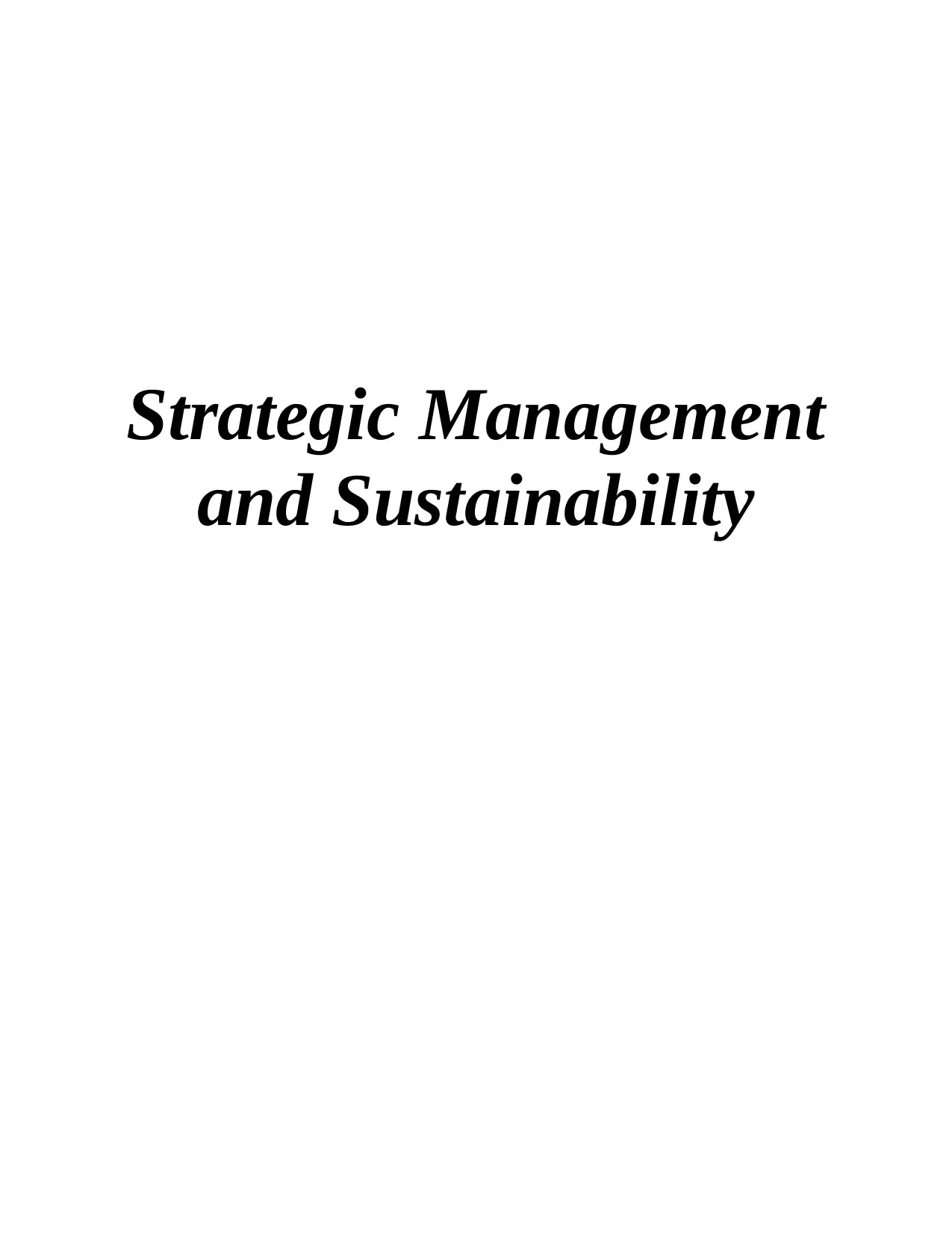
Strategic Management
and Sustainability
and Sustainability
Paraphrase This Document
Need a fresh take? Get an instant paraphrase of this document with our AI Paraphraser
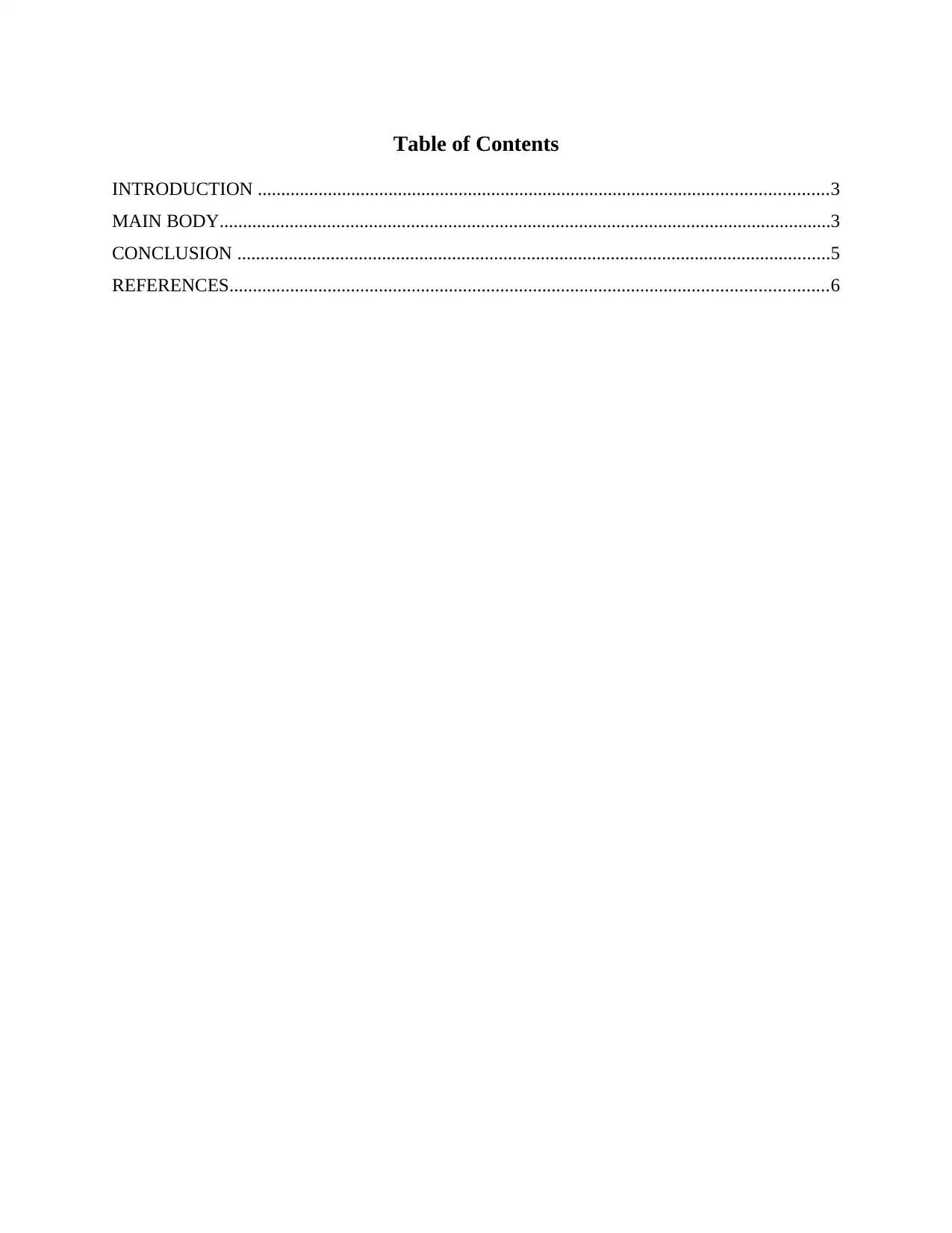
Table of Contents
INTRODUCTION ..........................................................................................................................3
MAIN BODY...................................................................................................................................3
CONCLUSION ...............................................................................................................................5
REFERENCES................................................................................................................................6
INTRODUCTION ..........................................................................................................................3
MAIN BODY...................................................................................................................................3
CONCLUSION ...............................................................................................................................5
REFERENCES................................................................................................................................6
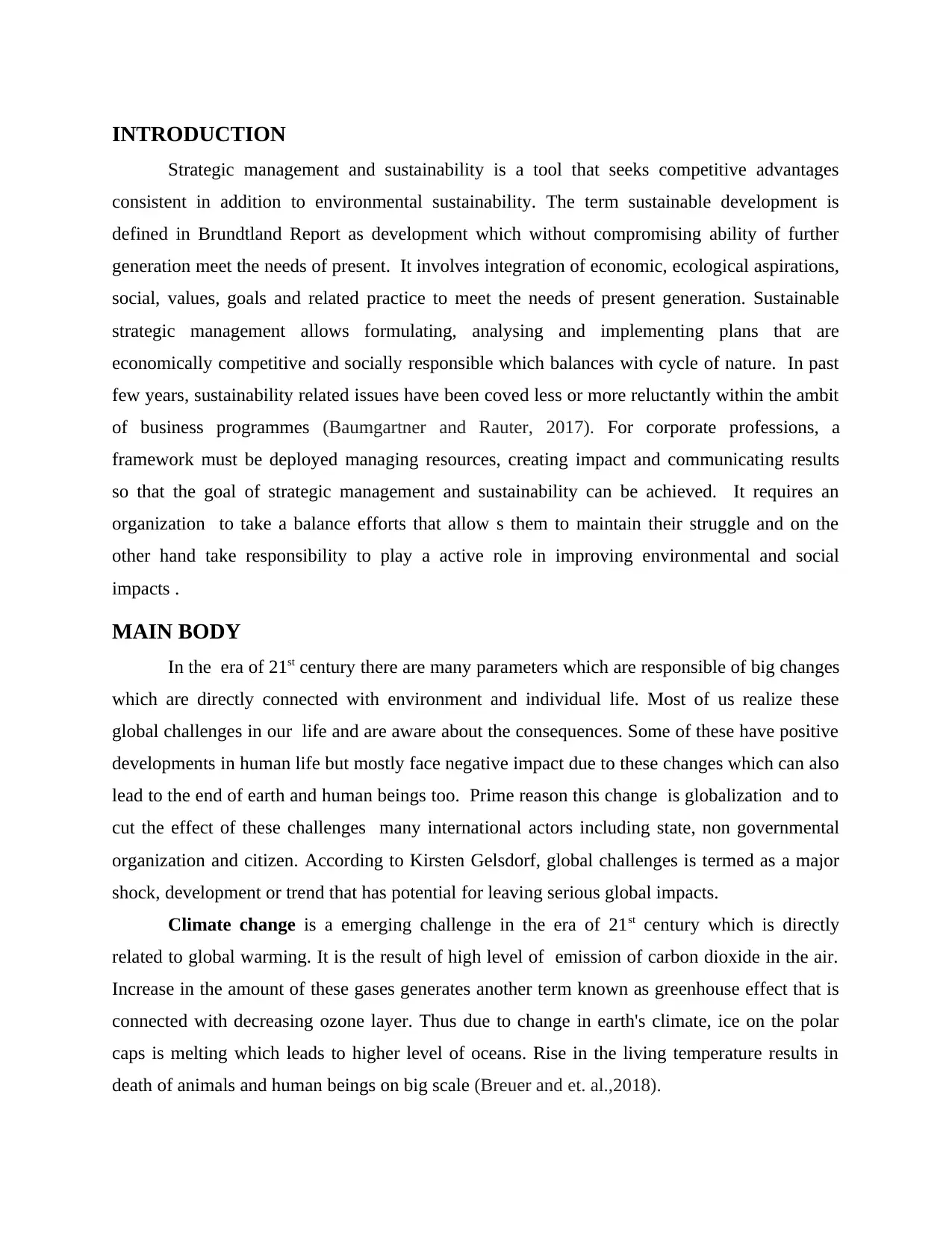
INTRODUCTION
Strategic management and sustainability is a tool that seeks competitive advantages
consistent in addition to environmental sustainability. The term sustainable development is
defined in Brundtland Report as development which without compromising ability of further
generation meet the needs of present. It involves integration of economic, ecological aspirations,
social, values, goals and related practice to meet the needs of present generation. Sustainable
strategic management allows formulating, analysing and implementing plans that are
economically competitive and socially responsible which balances with cycle of nature. In past
few years, sustainability related issues have been coved less or more reluctantly within the ambit
of business programmes (Baumgartner and Rauter, 2017). For corporate professions, a
framework must be deployed managing resources, creating impact and communicating results
so that the goal of strategic management and sustainability can be achieved. It requires an
organization to take a balance efforts that allow s them to maintain their struggle and on the
other hand take responsibility to play a active role in improving environmental and social
impacts .
MAIN BODY
In the era of 21st century there are many parameters which are responsible of big changes
which are directly connected with environment and individual life. Most of us realize these
global challenges in our life and are aware about the consequences. Some of these have positive
developments in human life but mostly face negative impact due to these changes which can also
lead to the end of earth and human beings too. Prime reason this change is globalization and to
cut the effect of these challenges many international actors including state, non governmental
organization and citizen. According to Kirsten Gelsdorf, global challenges is termed as a major
shock, development or trend that has potential for leaving serious global impacts.
Climate change is a emerging challenge in the era of 21st century which is directly
related to global warming. It is the result of high level of emission of carbon dioxide in the air.
Increase in the amount of these gases generates another term known as greenhouse effect that is
connected with decreasing ozone layer. Thus due to change in earth's climate, ice on the polar
caps is melting which leads to higher level of oceans. Rise in the living temperature results in
death of animals and human beings on big scale (Breuer and et. al.,2018).
Strategic management and sustainability is a tool that seeks competitive advantages
consistent in addition to environmental sustainability. The term sustainable development is
defined in Brundtland Report as development which without compromising ability of further
generation meet the needs of present. It involves integration of economic, ecological aspirations,
social, values, goals and related practice to meet the needs of present generation. Sustainable
strategic management allows formulating, analysing and implementing plans that are
economically competitive and socially responsible which balances with cycle of nature. In past
few years, sustainability related issues have been coved less or more reluctantly within the ambit
of business programmes (Baumgartner and Rauter, 2017). For corporate professions, a
framework must be deployed managing resources, creating impact and communicating results
so that the goal of strategic management and sustainability can be achieved. It requires an
organization to take a balance efforts that allow s them to maintain their struggle and on the
other hand take responsibility to play a active role in improving environmental and social
impacts .
MAIN BODY
In the era of 21st century there are many parameters which are responsible of big changes
which are directly connected with environment and individual life. Most of us realize these
global challenges in our life and are aware about the consequences. Some of these have positive
developments in human life but mostly face negative impact due to these changes which can also
lead to the end of earth and human beings too. Prime reason this change is globalization and to
cut the effect of these challenges many international actors including state, non governmental
organization and citizen. According to Kirsten Gelsdorf, global challenges is termed as a major
shock, development or trend that has potential for leaving serious global impacts.
Climate change is a emerging challenge in the era of 21st century which is directly
related to global warming. It is the result of high level of emission of carbon dioxide in the air.
Increase in the amount of these gases generates another term known as greenhouse effect that is
connected with decreasing ozone layer. Thus due to change in earth's climate, ice on the polar
caps is melting which leads to higher level of oceans. Rise in the living temperature results in
death of animals and human beings on big scale (Breuer and et. al.,2018).
⊘ This is a preview!⊘
Do you want full access?
Subscribe today to unlock all pages.

Trusted by 1+ million students worldwide
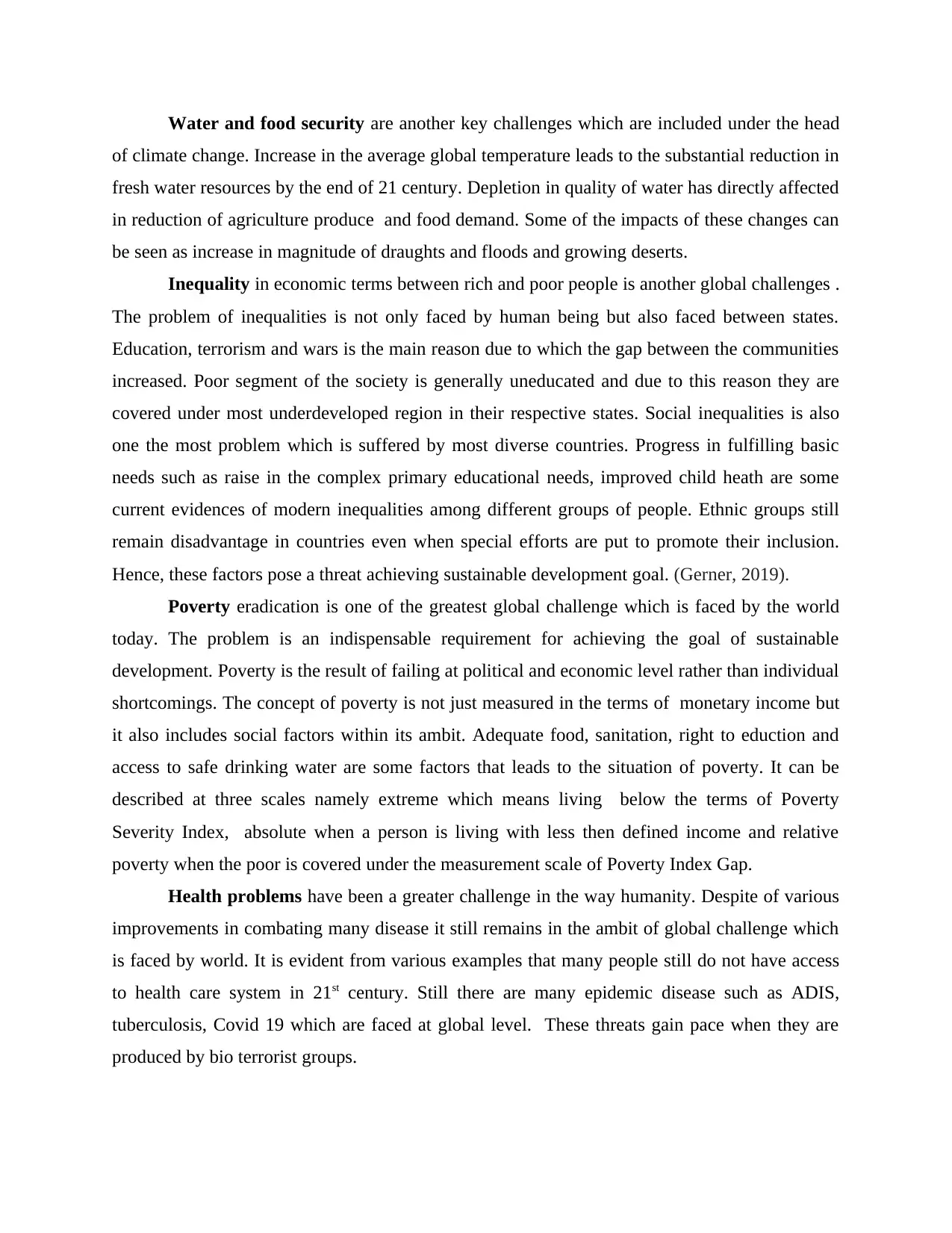
Water and food security are another key challenges which are included under the head
of climate change. Increase in the average global temperature leads to the substantial reduction in
fresh water resources by the end of 21 century. Depletion in quality of water has directly affected
in reduction of agriculture produce and food demand. Some of the impacts of these changes can
be seen as increase in magnitude of draughts and floods and growing deserts.
Inequality in economic terms between rich and poor people is another global challenges .
The problem of inequalities is not only faced by human being but also faced between states.
Education, terrorism and wars is the main reason due to which the gap between the communities
increased. Poor segment of the society is generally uneducated and due to this reason they are
covered under most underdeveloped region in their respective states. Social inequalities is also
one the most problem which is suffered by most diverse countries. Progress in fulfilling basic
needs such as raise in the complex primary educational needs, improved child heath are some
current evidences of modern inequalities among different groups of people. Ethnic groups still
remain disadvantage in countries even when special efforts are put to promote their inclusion.
Hence, these factors pose a threat achieving sustainable development goal. (Gerner, 2019).
Poverty eradication is one of the greatest global challenge which is faced by the world
today. The problem is an indispensable requirement for achieving the goal of sustainable
development. Poverty is the result of failing at political and economic level rather than individual
shortcomings. The concept of poverty is not just measured in the terms of monetary income but
it also includes social factors within its ambit. Adequate food, sanitation, right to eduction and
access to safe drinking water are some factors that leads to the situation of poverty. It can be
described at three scales namely extreme which means living below the terms of Poverty
Severity Index, absolute when a person is living with less then defined income and relative
poverty when the poor is covered under the measurement scale of Poverty Index Gap.
Health problems have been a greater challenge in the way humanity. Despite of various
improvements in combating many disease it still remains in the ambit of global challenge which
is faced by world. It is evident from various examples that many people still do not have access
to health care system in 21st century. Still there are many epidemic disease such as ADIS,
tuberculosis, Covid 19 which are faced at global level. These threats gain pace when they are
produced by bio terrorist groups.
of climate change. Increase in the average global temperature leads to the substantial reduction in
fresh water resources by the end of 21 century. Depletion in quality of water has directly affected
in reduction of agriculture produce and food demand. Some of the impacts of these changes can
be seen as increase in magnitude of draughts and floods and growing deserts.
Inequality in economic terms between rich and poor people is another global challenges .
The problem of inequalities is not only faced by human being but also faced between states.
Education, terrorism and wars is the main reason due to which the gap between the communities
increased. Poor segment of the society is generally uneducated and due to this reason they are
covered under most underdeveloped region in their respective states. Social inequalities is also
one the most problem which is suffered by most diverse countries. Progress in fulfilling basic
needs such as raise in the complex primary educational needs, improved child heath are some
current evidences of modern inequalities among different groups of people. Ethnic groups still
remain disadvantage in countries even when special efforts are put to promote their inclusion.
Hence, these factors pose a threat achieving sustainable development goal. (Gerner, 2019).
Poverty eradication is one of the greatest global challenge which is faced by the world
today. The problem is an indispensable requirement for achieving the goal of sustainable
development. Poverty is the result of failing at political and economic level rather than individual
shortcomings. The concept of poverty is not just measured in the terms of monetary income but
it also includes social factors within its ambit. Adequate food, sanitation, right to eduction and
access to safe drinking water are some factors that leads to the situation of poverty. It can be
described at three scales namely extreme which means living below the terms of Poverty
Severity Index, absolute when a person is living with less then defined income and relative
poverty when the poor is covered under the measurement scale of Poverty Index Gap.
Health problems have been a greater challenge in the way humanity. Despite of various
improvements in combating many disease it still remains in the ambit of global challenge which
is faced by world. It is evident from various examples that many people still do not have access
to health care system in 21st century. Still there are many epidemic disease such as ADIS,
tuberculosis, Covid 19 which are faced at global level. These threats gain pace when they are
produced by bio terrorist groups.
Paraphrase This Document
Need a fresh take? Get an instant paraphrase of this document with our AI Paraphraser
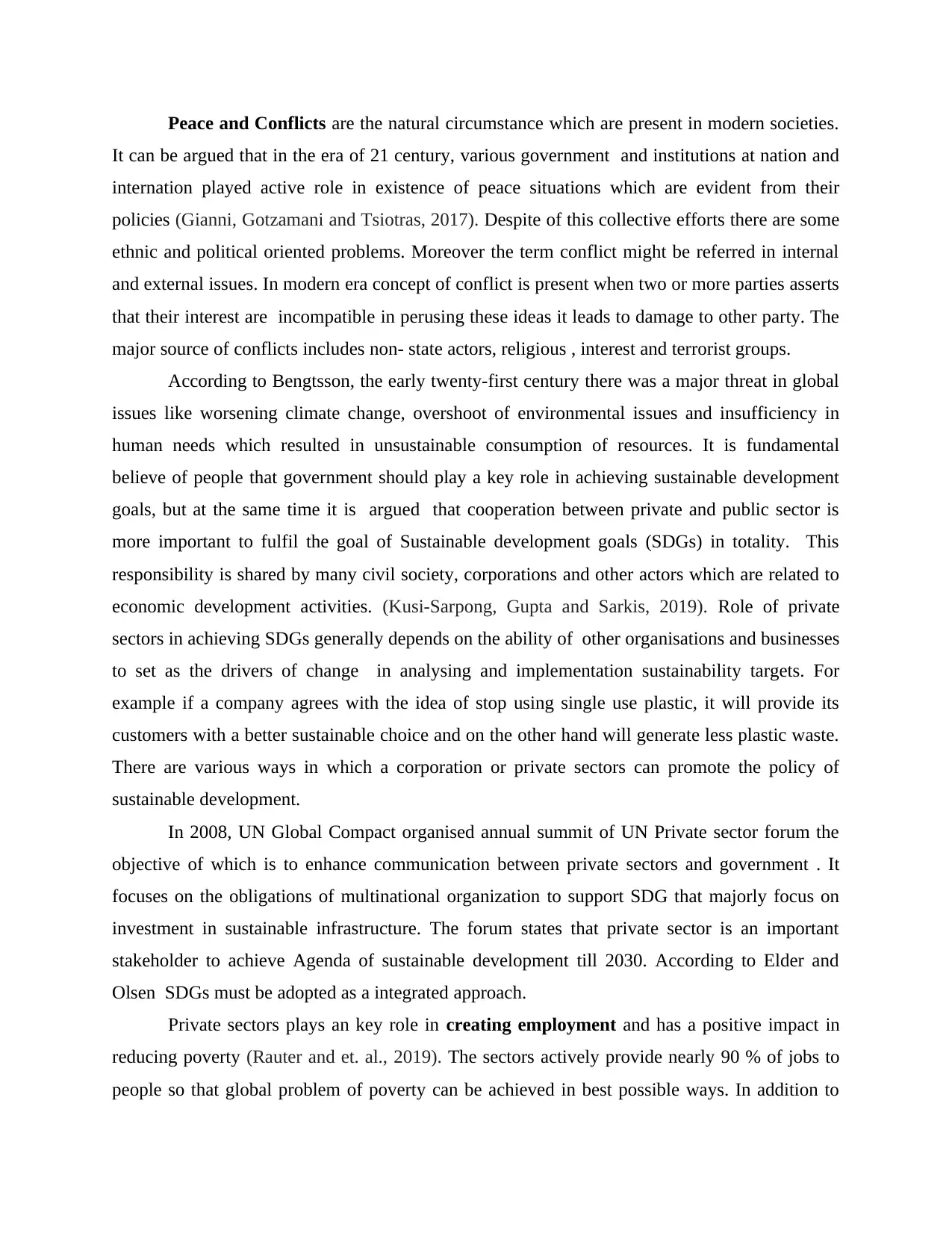
Peace and Conflicts are the natural circumstance which are present in modern societies.
It can be argued that in the era of 21 century, various government and institutions at nation and
internation played active role in existence of peace situations which are evident from their
policies (Gianni, Gotzamani and Tsiotras, 2017). Despite of this collective efforts there are some
ethnic and political oriented problems. Moreover the term conflict might be referred in internal
and external issues. In modern era concept of conflict is present when two or more parties asserts
that their interest are incompatible in perusing these ideas it leads to damage to other party. The
major source of conflicts includes non- state actors, religious , interest and terrorist groups.
According to Bengtsson, the early twenty-first century there was a major threat in global
issues like worsening climate change, overshoot of environmental issues and insufficiency in
human needs which resulted in unsustainable consumption of resources. It is fundamental
believe of people that government should play a key role in achieving sustainable development
goals, but at the same time it is argued that cooperation between private and public sector is
more important to fulfil the goal of Sustainable development goals (SDGs) in totality. This
responsibility is shared by many civil society, corporations and other actors which are related to
economic development activities. (Kusi-Sarpong, Gupta and Sarkis, 2019). Role of private
sectors in achieving SDGs generally depends on the ability of other organisations and businesses
to set as the drivers of change in analysing and implementation sustainability targets. For
example if a company agrees with the idea of stop using single use plastic, it will provide its
customers with a better sustainable choice and on the other hand will generate less plastic waste.
There are various ways in which a corporation or private sectors can promote the policy of
sustainable development.
In 2008, UN Global Compact organised annual summit of UN Private sector forum the
objective of which is to enhance communication between private sectors and government . It
focuses on the obligations of multinational organization to support SDG that majorly focus on
investment in sustainable infrastructure. The forum states that private sector is an important
stakeholder to achieve Agenda of sustainable development till 2030. According to Elder and
Olsen SDGs must be adopted as a integrated approach.
Private sectors plays an key role in creating employment and has a positive impact in
reducing poverty (Rauter and et. al., 2019). The sectors actively provide nearly 90 % of jobs to
people so that global problem of poverty can be achieved in best possible ways. In addition to
It can be argued that in the era of 21 century, various government and institutions at nation and
internation played active role in existence of peace situations which are evident from their
policies (Gianni, Gotzamani and Tsiotras, 2017). Despite of this collective efforts there are some
ethnic and political oriented problems. Moreover the term conflict might be referred in internal
and external issues. In modern era concept of conflict is present when two or more parties asserts
that their interest are incompatible in perusing these ideas it leads to damage to other party. The
major source of conflicts includes non- state actors, religious , interest and terrorist groups.
According to Bengtsson, the early twenty-first century there was a major threat in global
issues like worsening climate change, overshoot of environmental issues and insufficiency in
human needs which resulted in unsustainable consumption of resources. It is fundamental
believe of people that government should play a key role in achieving sustainable development
goals, but at the same time it is argued that cooperation between private and public sector is
more important to fulfil the goal of Sustainable development goals (SDGs) in totality. This
responsibility is shared by many civil society, corporations and other actors which are related to
economic development activities. (Kusi-Sarpong, Gupta and Sarkis, 2019). Role of private
sectors in achieving SDGs generally depends on the ability of other organisations and businesses
to set as the drivers of change in analysing and implementation sustainability targets. For
example if a company agrees with the idea of stop using single use plastic, it will provide its
customers with a better sustainable choice and on the other hand will generate less plastic waste.
There are various ways in which a corporation or private sectors can promote the policy of
sustainable development.
In 2008, UN Global Compact organised annual summit of UN Private sector forum the
objective of which is to enhance communication between private sectors and government . It
focuses on the obligations of multinational organization to support SDG that majorly focus on
investment in sustainable infrastructure. The forum states that private sector is an important
stakeholder to achieve Agenda of sustainable development till 2030. According to Elder and
Olsen SDGs must be adopted as a integrated approach.
Private sectors plays an key role in creating employment and has a positive impact in
reducing poverty (Rauter and et. al., 2019). The sectors actively provide nearly 90 % of jobs to
people so that global problem of poverty can be achieved in best possible ways. In addition to
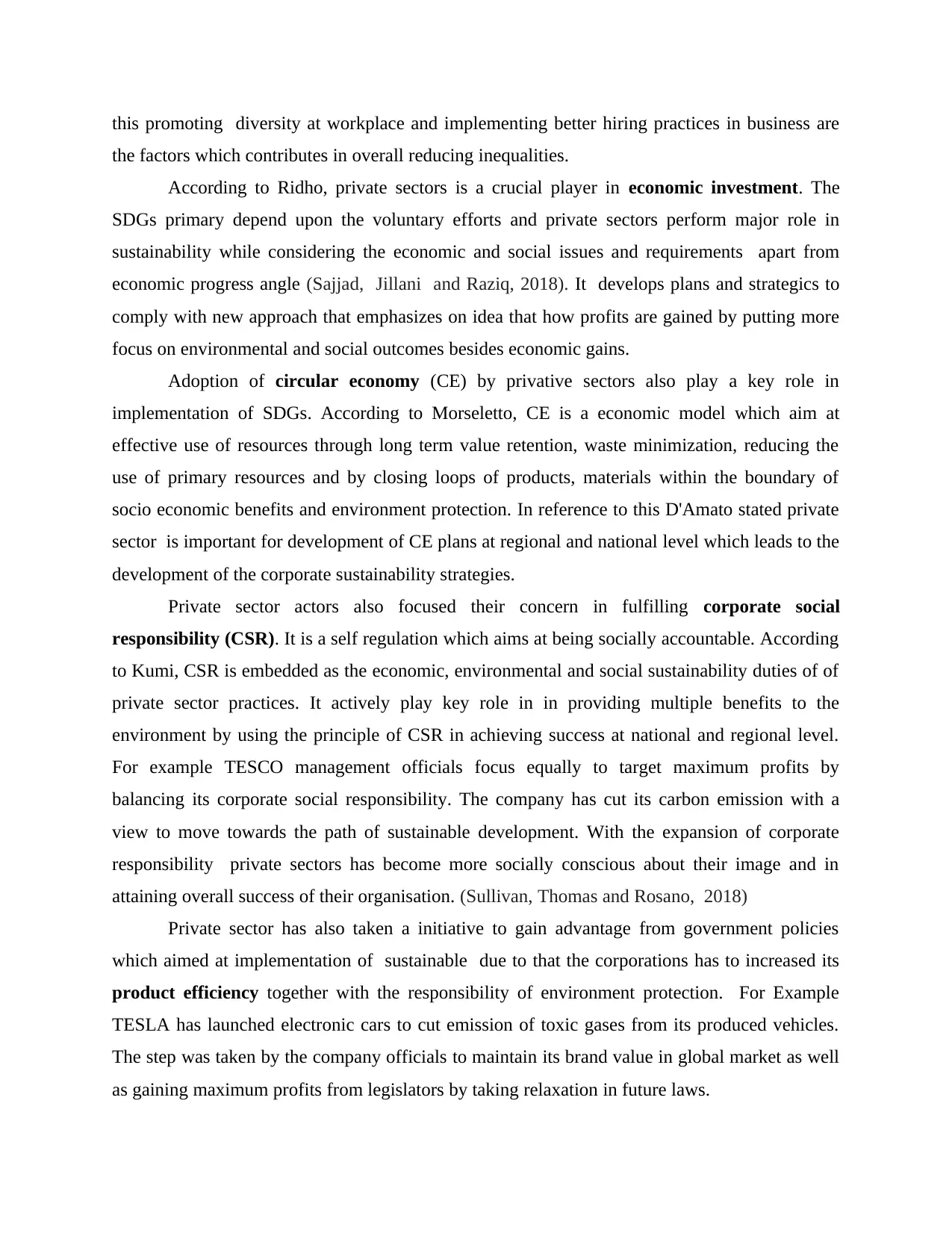
this promoting diversity at workplace and implementing better hiring practices in business are
the factors which contributes in overall reducing inequalities.
According to Ridho, private sectors is a crucial player in economic investment. The
SDGs primary depend upon the voluntary efforts and private sectors perform major role in
sustainability while considering the economic and social issues and requirements apart from
economic progress angle (Sajjad, Jillani and Raziq, 2018). It develops plans and strategics to
comply with new approach that emphasizes on idea that how profits are gained by putting more
focus on environmental and social outcomes besides economic gains.
Adoption of circular economy (CE) by privative sectors also play a key role in
implementation of SDGs. According to Morseletto, CE is a economic model which aim at
effective use of resources through long term value retention, waste minimization, reducing the
use of primary resources and by closing loops of products, materials within the boundary of
socio economic benefits and environment protection. In reference to this D'Amato stated private
sector is important for development of CE plans at regional and national level which leads to the
development of the corporate sustainability strategies.
Private sector actors also focused their concern in fulfilling corporate social
responsibility (CSR). It is a self regulation which aims at being socially accountable. According
to Kumi, CSR is embedded as the economic, environmental and social sustainability duties of of
private sector practices. It actively play key role in in providing multiple benefits to the
environment by using the principle of CSR in achieving success at national and regional level.
For example TESCO management officials focus equally to target maximum profits by
balancing its corporate social responsibility. The company has cut its carbon emission with a
view to move towards the path of sustainable development. With the expansion of corporate
responsibility private sectors has become more socially conscious about their image and in
attaining overall success of their organisation. (Sullivan, Thomas and Rosano, 2018)
Private sector has also taken a initiative to gain advantage from government policies
which aimed at implementation of sustainable due to that the corporations has to increased its
product efficiency together with the responsibility of environment protection. For Example
TESLA has launched electronic cars to cut emission of toxic gases from its produced vehicles.
The step was taken by the company officials to maintain its brand value in global market as well
as gaining maximum profits from legislators by taking relaxation in future laws.
the factors which contributes in overall reducing inequalities.
According to Ridho, private sectors is a crucial player in economic investment. The
SDGs primary depend upon the voluntary efforts and private sectors perform major role in
sustainability while considering the economic and social issues and requirements apart from
economic progress angle (Sajjad, Jillani and Raziq, 2018). It develops plans and strategics to
comply with new approach that emphasizes on idea that how profits are gained by putting more
focus on environmental and social outcomes besides economic gains.
Adoption of circular economy (CE) by privative sectors also play a key role in
implementation of SDGs. According to Morseletto, CE is a economic model which aim at
effective use of resources through long term value retention, waste minimization, reducing the
use of primary resources and by closing loops of products, materials within the boundary of
socio economic benefits and environment protection. In reference to this D'Amato stated private
sector is important for development of CE plans at regional and national level which leads to the
development of the corporate sustainability strategies.
Private sector actors also focused their concern in fulfilling corporate social
responsibility (CSR). It is a self regulation which aims at being socially accountable. According
to Kumi, CSR is embedded as the economic, environmental and social sustainability duties of of
private sector practices. It actively play key role in in providing multiple benefits to the
environment by using the principle of CSR in achieving success at national and regional level.
For example TESCO management officials focus equally to target maximum profits by
balancing its corporate social responsibility. The company has cut its carbon emission with a
view to move towards the path of sustainable development. With the expansion of corporate
responsibility private sectors has become more socially conscious about their image and in
attaining overall success of their organisation. (Sullivan, Thomas and Rosano, 2018)
Private sector has also taken a initiative to gain advantage from government policies
which aimed at implementation of sustainable due to that the corporations has to increased its
product efficiency together with the responsibility of environment protection. For Example
TESLA has launched electronic cars to cut emission of toxic gases from its produced vehicles.
The step was taken by the company officials to maintain its brand value in global market as well
as gaining maximum profits from legislators by taking relaxation in future laws.
⊘ This is a preview!⊘
Do you want full access?
Subscribe today to unlock all pages.

Trusted by 1+ million students worldwide
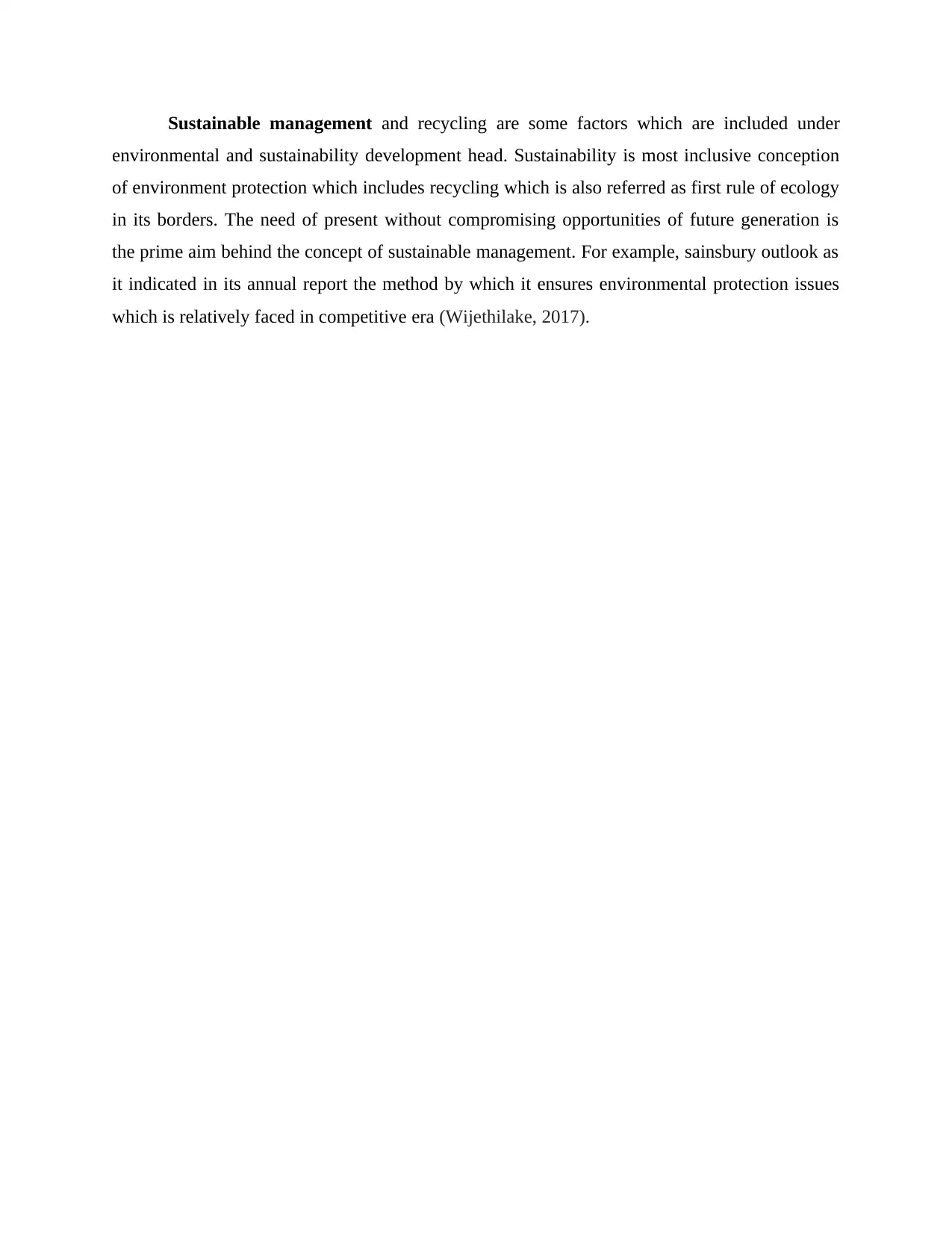
Sustainable management and recycling are some factors which are included under
environmental and sustainability development head. Sustainability is most inclusive conception
of environment protection which includes recycling which is also referred as first rule of ecology
in its borders. The need of present without compromising opportunities of future generation is
the prime aim behind the concept of sustainable management. For example, sainsbury outlook as
it indicated in its annual report the method by which it ensures environmental protection issues
which is relatively faced in competitive era (Wijethilake, 2017).
environmental and sustainability development head. Sustainability is most inclusive conception
of environment protection which includes recycling which is also referred as first rule of ecology
in its borders. The need of present without compromising opportunities of future generation is
the prime aim behind the concept of sustainable management. For example, sainsbury outlook as
it indicated in its annual report the method by which it ensures environmental protection issues
which is relatively faced in competitive era (Wijethilake, 2017).
Paraphrase This Document
Need a fresh take? Get an instant paraphrase of this document with our AI Paraphraser
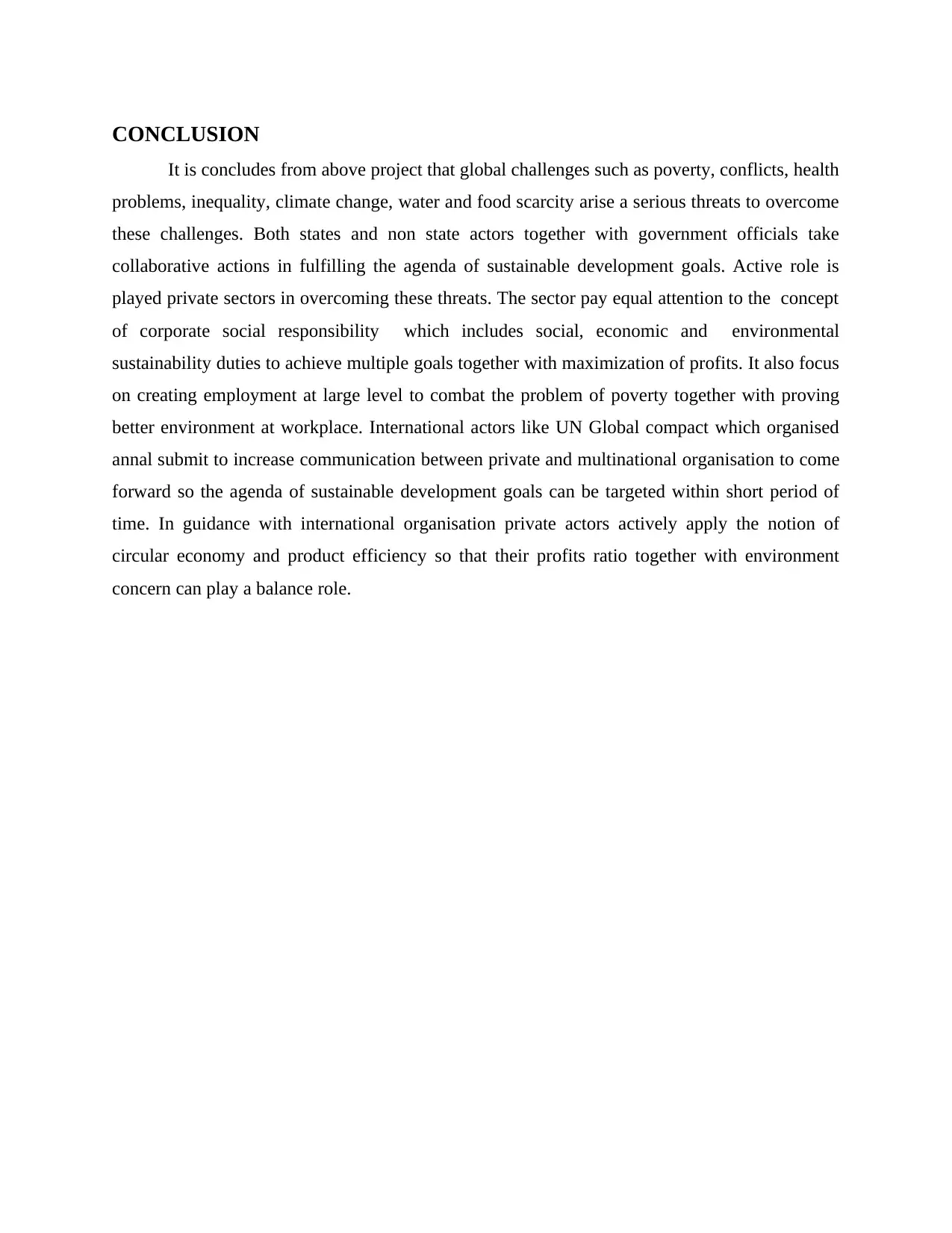
CONCLUSION
It is concludes from above project that global challenges such as poverty, conflicts, health
problems, inequality, climate change, water and food scarcity arise a serious threats to overcome
these challenges. Both states and non state actors together with government officials take
collaborative actions in fulfilling the agenda of sustainable development goals. Active role is
played private sectors in overcoming these threats. The sector pay equal attention to the concept
of corporate social responsibility which includes social, economic and environmental
sustainability duties to achieve multiple goals together with maximization of profits. It also focus
on creating employment at large level to combat the problem of poverty together with proving
better environment at workplace. International actors like UN Global compact which organised
annal submit to increase communication between private and multinational organisation to come
forward so the agenda of sustainable development goals can be targeted within short period of
time. In guidance with international organisation private actors actively apply the notion of
circular economy and product efficiency so that their profits ratio together with environment
concern can play a balance role.
It is concludes from above project that global challenges such as poverty, conflicts, health
problems, inequality, climate change, water and food scarcity arise a serious threats to overcome
these challenges. Both states and non state actors together with government officials take
collaborative actions in fulfilling the agenda of sustainable development goals. Active role is
played private sectors in overcoming these threats. The sector pay equal attention to the concept
of corporate social responsibility which includes social, economic and environmental
sustainability duties to achieve multiple goals together with maximization of profits. It also focus
on creating employment at large level to combat the problem of poverty together with proving
better environment at workplace. International actors like UN Global compact which organised
annal submit to increase communication between private and multinational organisation to come
forward so the agenda of sustainable development goals can be targeted within short period of
time. In guidance with international organisation private actors actively apply the notion of
circular economy and product efficiency so that their profits ratio together with environment
concern can play a balance role.
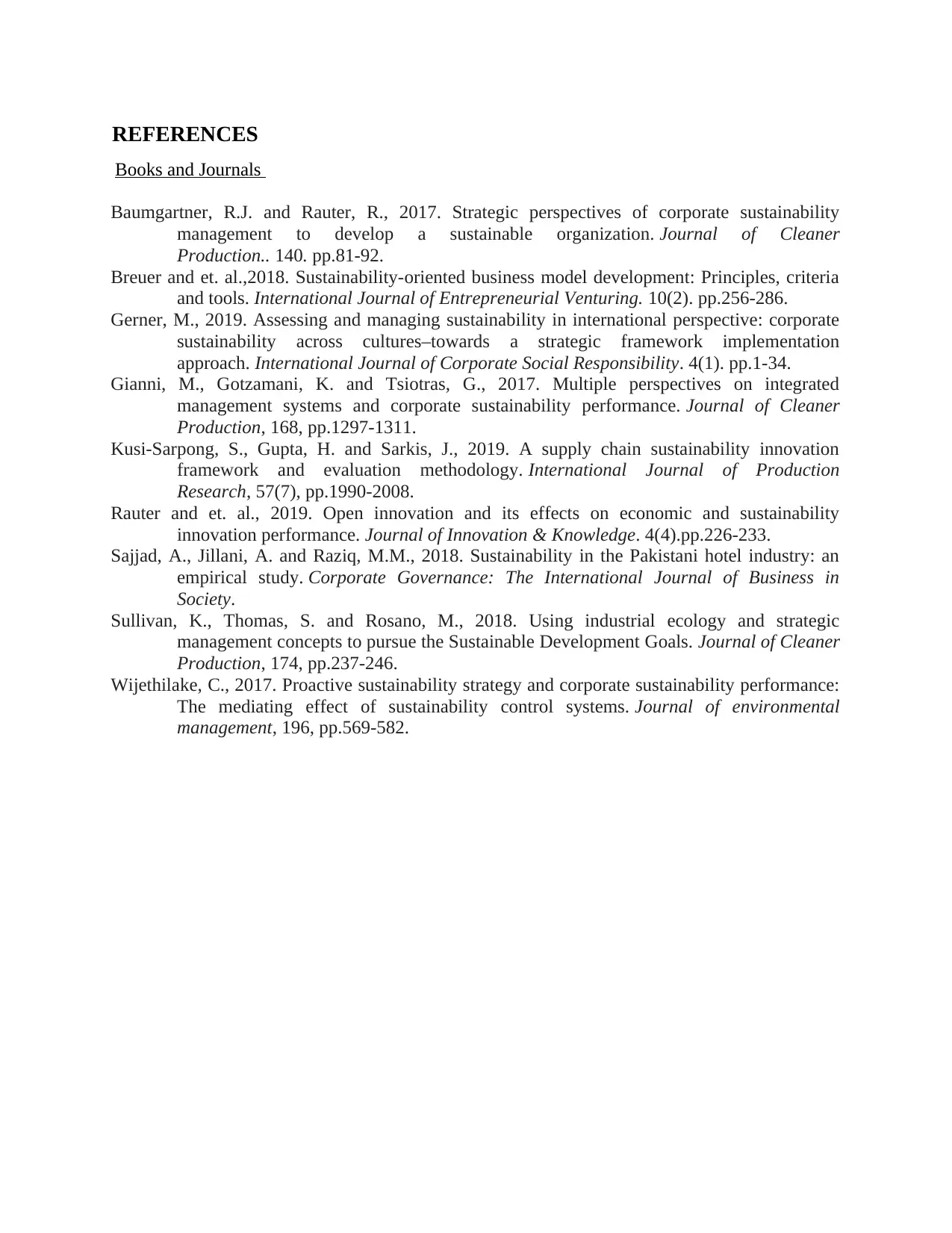
REFERENCES
Books and Journals
Baumgartner, R.J. and Rauter, R., 2017. Strategic perspectives of corporate sustainability
management to develop a sustainable organization. Journal of Cleaner
Production.. 140. pp.81-92.
Breuer and et. al.,2018. Sustainability-oriented business model development: Principles, criteria
and tools. International Journal of Entrepreneurial Venturing. 10(2). pp.256-286.
Gerner, M., 2019. Assessing and managing sustainability in international perspective: corporate
sustainability across cultures–towards a strategic framework implementation
approach. International Journal of Corporate Social Responsibility. 4(1). pp.1-34.
Gianni, M., Gotzamani, K. and Tsiotras, G., 2017. Multiple perspectives on integrated
management systems and corporate sustainability performance. Journal of Cleaner
Production, 168, pp.1297-1311.
Kusi-Sarpong, S., Gupta, H. and Sarkis, J., 2019. A supply chain sustainability innovation
framework and evaluation methodology. International Journal of Production
Research, 57(7), pp.1990-2008.
Rauter and et. al., 2019. Open innovation and its effects on economic and sustainability
innovation performance. Journal of Innovation & Knowledge. 4(4).pp.226-233.
Sajjad, A., Jillani, A. and Raziq, M.M., 2018. Sustainability in the Pakistani hotel industry: an
empirical study. Corporate Governance: The International Journal of Business in
Society.
Sullivan, K., Thomas, S. and Rosano, M., 2018. Using industrial ecology and strategic
management concepts to pursue the Sustainable Development Goals. Journal of Cleaner
Production, 174, pp.237-246.
Wijethilake, C., 2017. Proactive sustainability strategy and corporate sustainability performance:
The mediating effect of sustainability control systems. Journal of environmental
management, 196, pp.569-582.
Books and Journals
Baumgartner, R.J. and Rauter, R., 2017. Strategic perspectives of corporate sustainability
management to develop a sustainable organization. Journal of Cleaner
Production.. 140. pp.81-92.
Breuer and et. al.,2018. Sustainability-oriented business model development: Principles, criteria
and tools. International Journal of Entrepreneurial Venturing. 10(2). pp.256-286.
Gerner, M., 2019. Assessing and managing sustainability in international perspective: corporate
sustainability across cultures–towards a strategic framework implementation
approach. International Journal of Corporate Social Responsibility. 4(1). pp.1-34.
Gianni, M., Gotzamani, K. and Tsiotras, G., 2017. Multiple perspectives on integrated
management systems and corporate sustainability performance. Journal of Cleaner
Production, 168, pp.1297-1311.
Kusi-Sarpong, S., Gupta, H. and Sarkis, J., 2019. A supply chain sustainability innovation
framework and evaluation methodology. International Journal of Production
Research, 57(7), pp.1990-2008.
Rauter and et. al., 2019. Open innovation and its effects on economic and sustainability
innovation performance. Journal of Innovation & Knowledge. 4(4).pp.226-233.
Sajjad, A., Jillani, A. and Raziq, M.M., 2018. Sustainability in the Pakistani hotel industry: an
empirical study. Corporate Governance: The International Journal of Business in
Society.
Sullivan, K., Thomas, S. and Rosano, M., 2018. Using industrial ecology and strategic
management concepts to pursue the Sustainable Development Goals. Journal of Cleaner
Production, 174, pp.237-246.
Wijethilake, C., 2017. Proactive sustainability strategy and corporate sustainability performance:
The mediating effect of sustainability control systems. Journal of environmental
management, 196, pp.569-582.
⊘ This is a preview!⊘
Do you want full access?
Subscribe today to unlock all pages.

Trusted by 1+ million students worldwide

1 out of 10
Related Documents
Your All-in-One AI-Powered Toolkit for Academic Success.
+13062052269
info@desklib.com
Available 24*7 on WhatsApp / Email
![[object Object]](/_next/static/media/star-bottom.7253800d.svg)
Unlock your academic potential
Copyright © 2020–2025 A2Z Services. All Rights Reserved. Developed and managed by ZUCOL.




